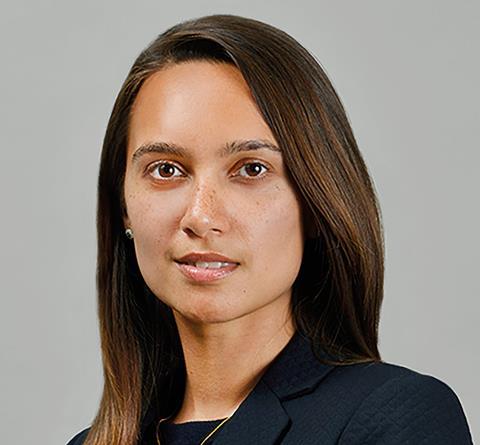My undergraduate degree was in mathematics at King’s College London. I spent the summers working in the state rooms at Buckingham Palace. I met someone training to be a lawyer during one of those summers and that was the first time I really considered the law as a career. After I graduated, I took a leap of faith and enrolled in law school. I never looked back.

I trained at Chadbourne & Parke, then moved soon after qualification to another New York law firm called Willkie Farr & Gallagher. I have always worked for US law firms, which suits me very well for the same reason my degree was right for me. I like the intensity, the challenging environment and the success that feels all the more rewarding thereafter.
I started out as a general corporate and private equity associate. But for the past six years I have focused more on venture capital work in life sciences and technology. I work closely with a life sciences client based in California. Having spent some time at the science park where the client is based, this sparked my desire to work in these sectors even more.
I have always loved science and in my youth I wanted to be a cardiothoracic surgeon. For various reasons, I was unable to pursue that career, but I am very glad that I have managed to find my way back to science in my current career, which I think is rather poetic.
My experience in life sciences has led me to FemTech, which is essentially innovation in women’s health and wellness. It is a really exciting growth area, which I am very passionate about. As a transatlantic law firm, we are able to connect companies innovating in this space with healthcare-focused investors in the UK and the US, and advise companies and investors from the startup phase all the way to exit.
'Equity means we should ensure we are impartial, fair and provide equal opportunities for everyone. Inclusion means we need to ensure people feel a sense of belonging in the workplace'
Earlier this year, we hosted a FemTech pitch event at our London office, where eight women’s health and wellness companies pitched ‘Dragons’ Den’ style to a panel of investors. We are launching the FemTech initiative in the US later this year with a similar event, which will be hosted in our New York office in November.
There is also a symbiosis between FemTech and diversity, equity and inclusion (DEI). This is very important to me, particularly given my recent appointment to DEI partner at Brown Rudnick. Diversity covers so many traits, including race, ethnicity, gender, gender identity, sexual orientation, age, socioeconomic class, physical ability, veteran status and whether you have children. Equity means we should ensure we are impartial, fair and provide equal opportunities for everyone. Inclusion means we need to ensure people feel a sense of belonging in the workplace, that they can be their authentic selves. I believe that happiness is the key to success, so if we create a happy work environment then everyone will have a chance to thrive. DEI is at the heart of so many things, even if we don’t realise it.
On 29 June this year, the US Supreme Court voted to strike down affirmative action in higher education. This ended a four-decade precedent that allowed colleges and universities to broadly consider applicants’ race in their admissions processes. This ruling will have far-reaching implications for the pipeline to the legal profession of BAME and underrepresented populations. While the true impact of the ruling has yet to be felt, it is likely to lead to fewer employment opportunities across many industries for people of colour if fewer are admitted to colleges. As a result, recruiting and hiring efforts in these professions will be impacted. Similarly, there are many pain points in the pipeline to legal practice in the UK, including access to work experience, training contracts and preparation for the rigours of the profession. This will need to be addressed by all organisations that aim to have diverse and inclusive workplaces.
There are, however, some positive DEI stories to tell. I was promoted to partner this year alongside an all-female partner class in London. It is motivating to work at a firm that promotes the best person for the job, irrespective of gender, age, ethnicity or any other factor. While there is still a lot of work to be done in the legal sector more broadly, I am excited to play my part in my new role as DEI partner.































No comments yet